The last (porn) picture shows: Once dotted with dozens of adult cinemas, L.A. now has only two
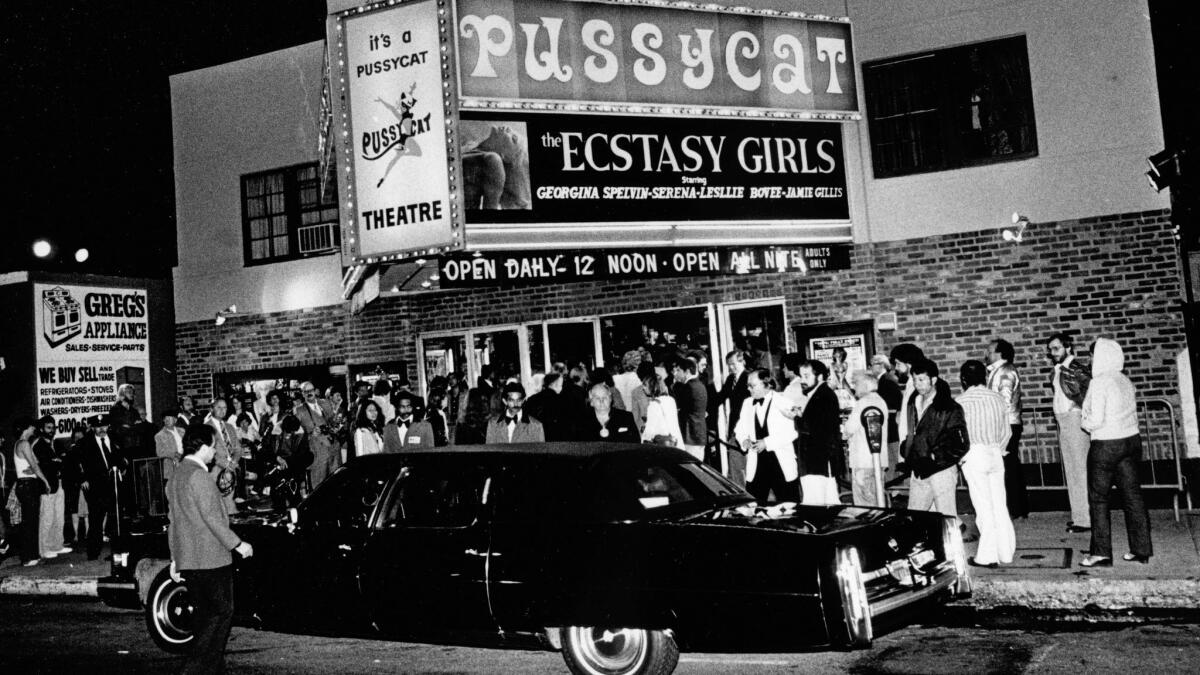
- Share via
In the age of the Internet, the idea of watching porn in an actual movie house might seem like a quaint act from another era — like pumping water or dialing up AOL. At a recent party of 30- and 40-year-olds, someone asked how many people had been to a porn theater. Only three hands went up. Mine was one of them.
Let me explain.
It was the 1990s, in the Chilean city of Concepción, and prevailing Catholic propriety prevented certain art-house masterpieces from showing at “proper” theaters due to their racy sex scenes. This is why my first — and, until recently, my only — trip to a porn theater was to see “The Tin Drum.”
Based on a novel by Günter Grass, the Oscar-winning film about a boy who refuses to grow played at a local cine erótico. The Cine Windsor, a faded 1940s movie house with frayed carpets and worn seats, screened a mix of pornography and anything considered too avant-garde in the nudity department.
Films at the Windsor (like many adult cinemas) screened back-to-back, so the previous film was still playing when we arrived to watch “The Tin Drum.” I can’t remember the name or the plot. All I recall is a wall-sized tangle of limbs, the presence of mustaches, the oh-oh-ohs that emanated from the sound system and the furtive stares I received from the men scattered around the room.
I was the only woman in the theater.
Today the Cine Windsor is gone, the building gutted and converted into a hotel, the besuited Chilean gentlemen who had viewed its wares long dispersed.
Such is the fate of the adult cinema — and not just in Chile.
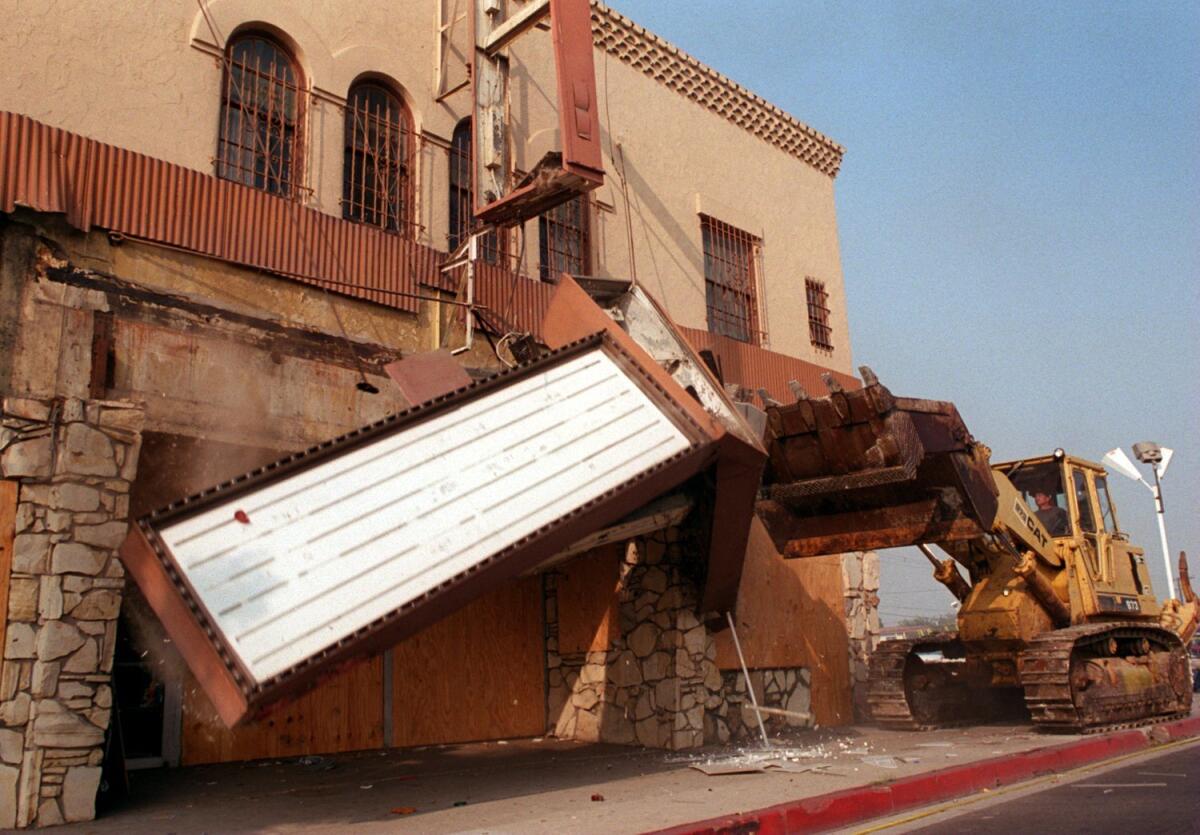
In 1979, there were an estimated 800 porn theaters across the United States. But video and streaming have rendered them obsolete. The website Cinema Treasures lists fewer than 35 places now operating as adult theaters in the U.S.
In the 1970s, Los Angeles teemed with dozens of porn theaters. Now only two remain: the Studs and the Tiki. They sit at opposite ends of Santa Monica Boulevard — the former in West Hollywood, the latter in East Hollywood, framing the city in an unseen porno-magnetic field. Both beckon with promises of titillation and, in the case of the Studs, a tag line that reads, “Come explore, relax, and take a load off.”
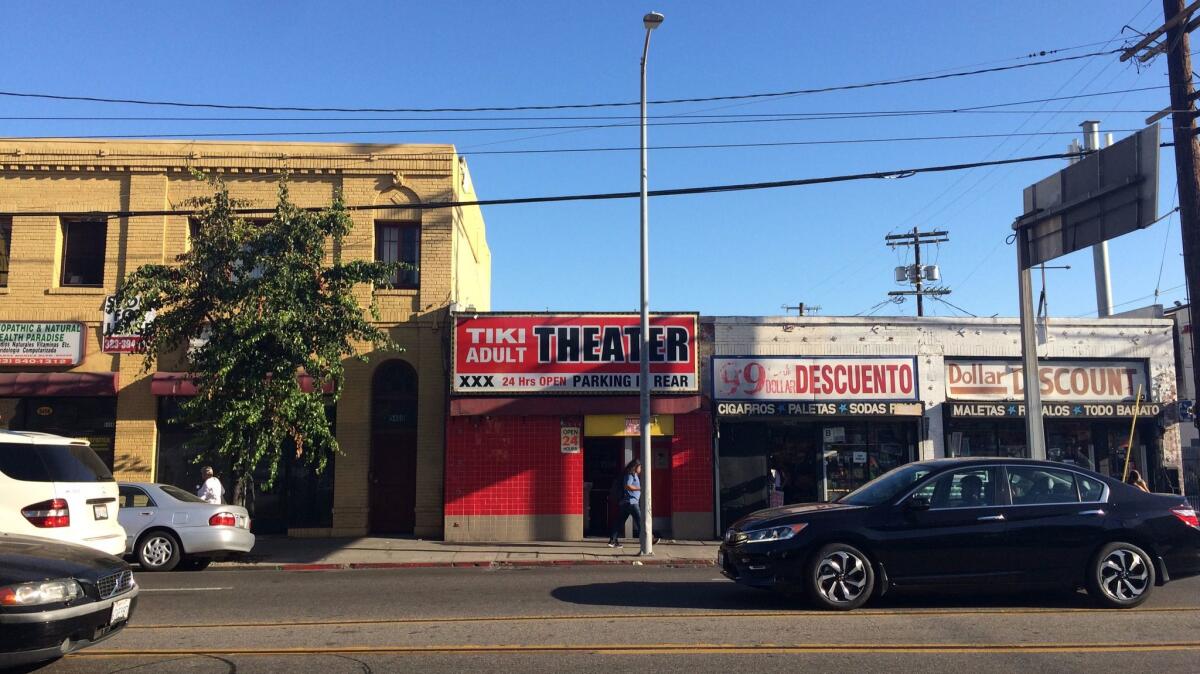
To investigate these last bastions of adult cinema, I enlisted the help of Los Angeles painter Zak Smith.
Smith is a Yale-educated artist who has appeared in more than half a dozen porn films under the name Zak Sabbath. He chronicled his experiences in the 2009 memoir “We Did Porn.” (Original drawings from that project are currently on view at Fabien Castanier Gallery in Culver City.)
He was curious to explore the L.A. theaters, neither of which he had visited.
“They’re vestigial,” he says. “Like with everything else, the old platforms for porn are being phased out. Software adapts fast, hardware adapts slower — and a theater is the ultimate hardware.”
Plus, Smith sees them as symbols of the ways in which sprawling Los Angeles can unwittingly harbor forgotten pockets of history.
“L.A.,” he explains, “is one of those places that always manages to have at least one of something that shouldn’t exist.”
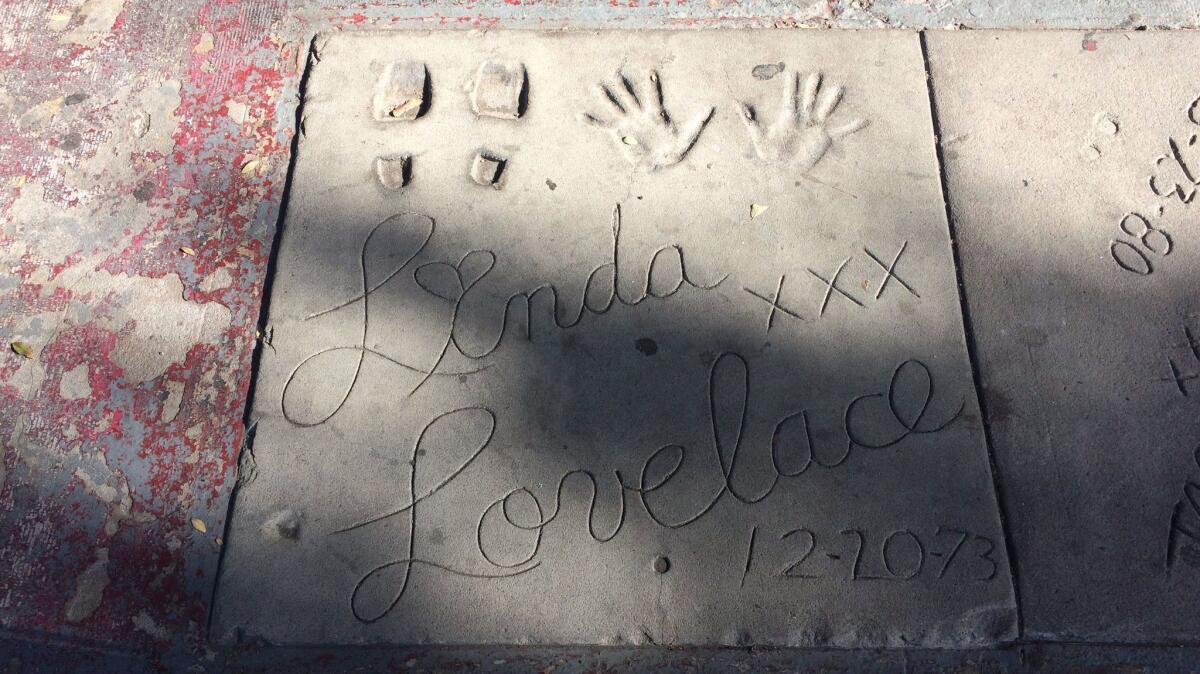
A ‘Smithsonian’ of porn
We begin at Studs.
On a hot Thursday afternoon, we pay the $20 admission fee and are soon enveloped by the groans of frantic copulation.
Smith turns to me and says, “Well, the smell doesn’t disappoint.” The air in the lobby harbors the distinct aroma of men’s bathroom and disinfectant.
Once a large, Modernist movie house from the ‘40s, the Studs now consists of four screening rooms. Three small ones play gay, straight and transgender porn — something for everyone. The large screening room, bearing a 25-foot screen and red chandeliers, is devoted primarily to gay pictures.
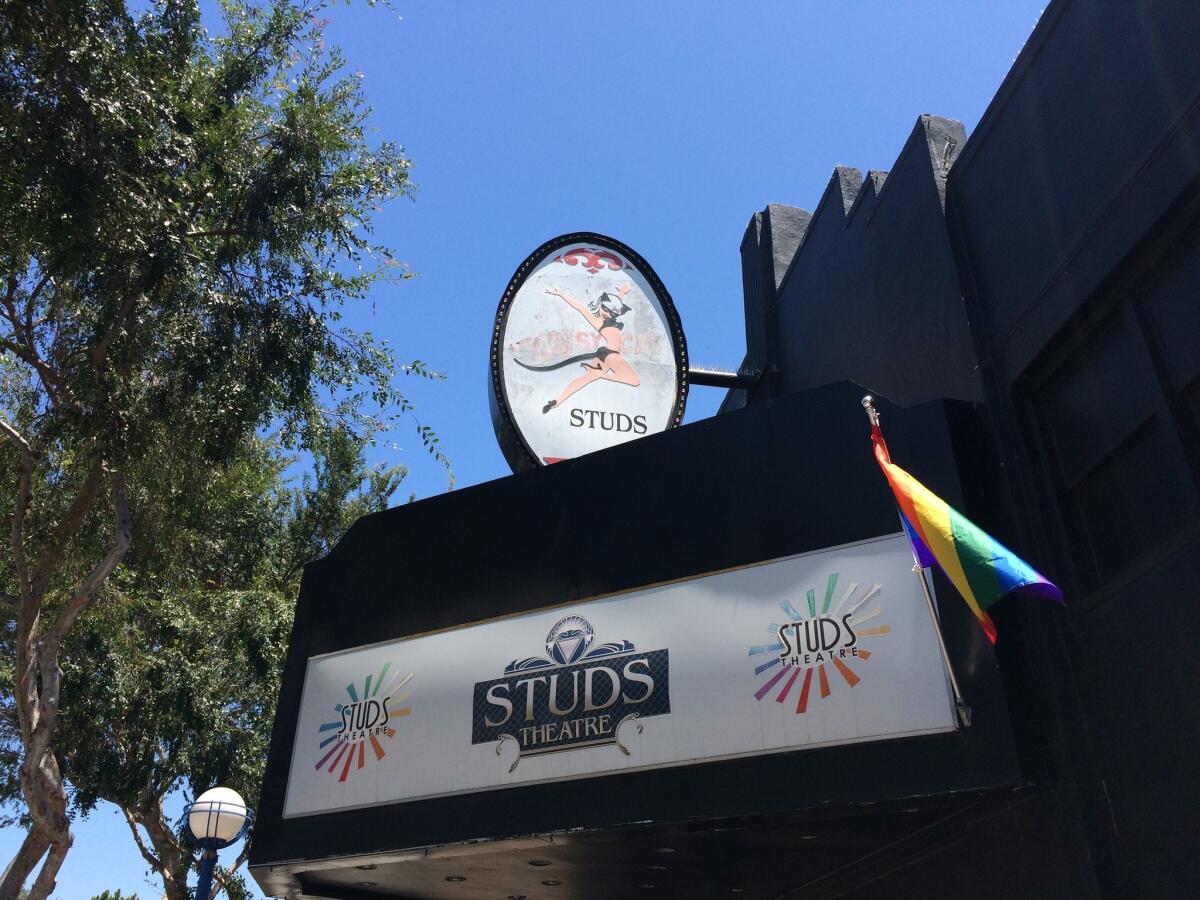
On the day we visit, a movie titled “Lords of the Jungle” shows various combinations of men in flagrante delicto in tropical settings. (From the synopsis: “Ten men. One island. An eruption of lust and desire!”) We take a seat.
Smith, who does straight porn and describes himself as a “nihilist porn actor who wears all black,” tells me about seeing himself on the big screen for the first time. It was in Germany, at the annual Porn Film Festival Berlin, where he was presenting his first adult movie, “Barbed Wire Kiss,” from 2006.
“It’s in this beautiful theater — they serve tea and beer in a mug,” he recalls. “And I was in the front row. And it was every word, every breath … and it’s like, omigod.”
At the Q&A afterward, moviegoers in the largely German audience asked earnest questions about positions and aesthetics.
But going to a porn house, says Smith, isn’t really about watching the movie.
RELATED SERIES: The past, present and uncertain future of the multiplex
“Watching porn with other people is always about watching the other people watch porn,” he explains. “You’re never in it completely.”
Certainly, as our eyes adjust to the dim lighting, we realize that there are roughly half a dozen men in the room. Two are making out. Several are looking our way to see what sorts of signals we might send.
One of the tropes in news stories about adult cinemas is that the audience consists of leering perverts in raincoats. In actuality, it’s older men in golf shirts. It couldn’t be more ordinary.
Studs is most interesting to me because of what the location represents.
You had to go out of your home and risk being seen, risk being recognized. Everyone sat very far apart.
— Nina Hartley, adult film star
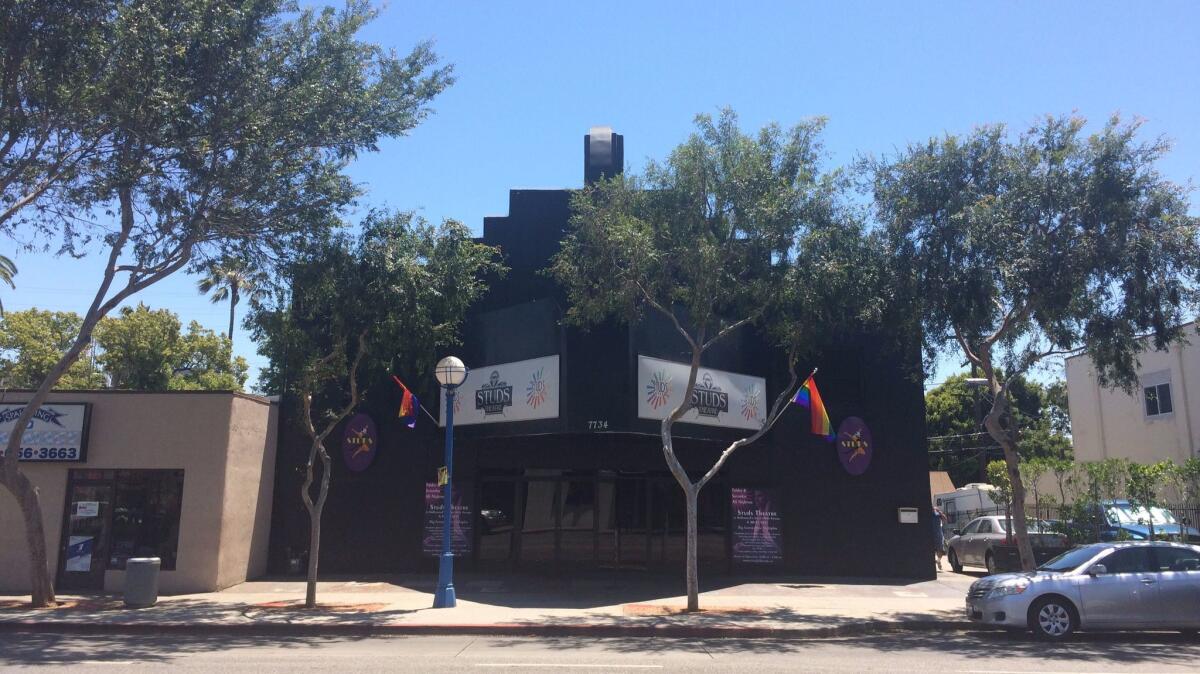
Many porn palaces in urban centers were housed in old ’30s and ’40s movie houses whose original audiences had, by the ’70s, fled to the suburbs (and the multiplex). As the Sexual Revolution ushered in more relaxed attitudes towards sex, however, these cinemas began to entice with films such as “Sex Clinic Girls” or “Resurrection of Eve” and lurid red letters that blared “XXX.”
In L.A., there was the Europa, the Park and the Uptown Adult — all of which began life showing Hollywood blockbusters but ultimately turned to porn. And there were numerous branches of the famed Pussycat Theater, a chain of 50-plus adult movie houses clustered around Southern California.
J.J. Englender, an archivist who founded the website Adsausage.com, which is devoted to chronicling vintage advertising (including that of theaters), tells me that the Studs began life in the ’40s as the Monica. Then it “moved into saucy Euro imports,” which was followed by “X-rated stuff.” Over the course of its life it was known as the Leftbank Theatre and the Tomkat. But it is perhaps most famous for its turn as a Pussycat Theater in the ’70s and ’80s.
“In the history of adult film, that is one of the most important spaces in North America,” says Peter Alilunas, a professor of media studies at the
The theater — along with the entire Pussycat chain — came of age during the so-called “Golden Age of Porn,” a period from the late ’60s to the early ’80s, when pornography became a more accepted part of popular culture.
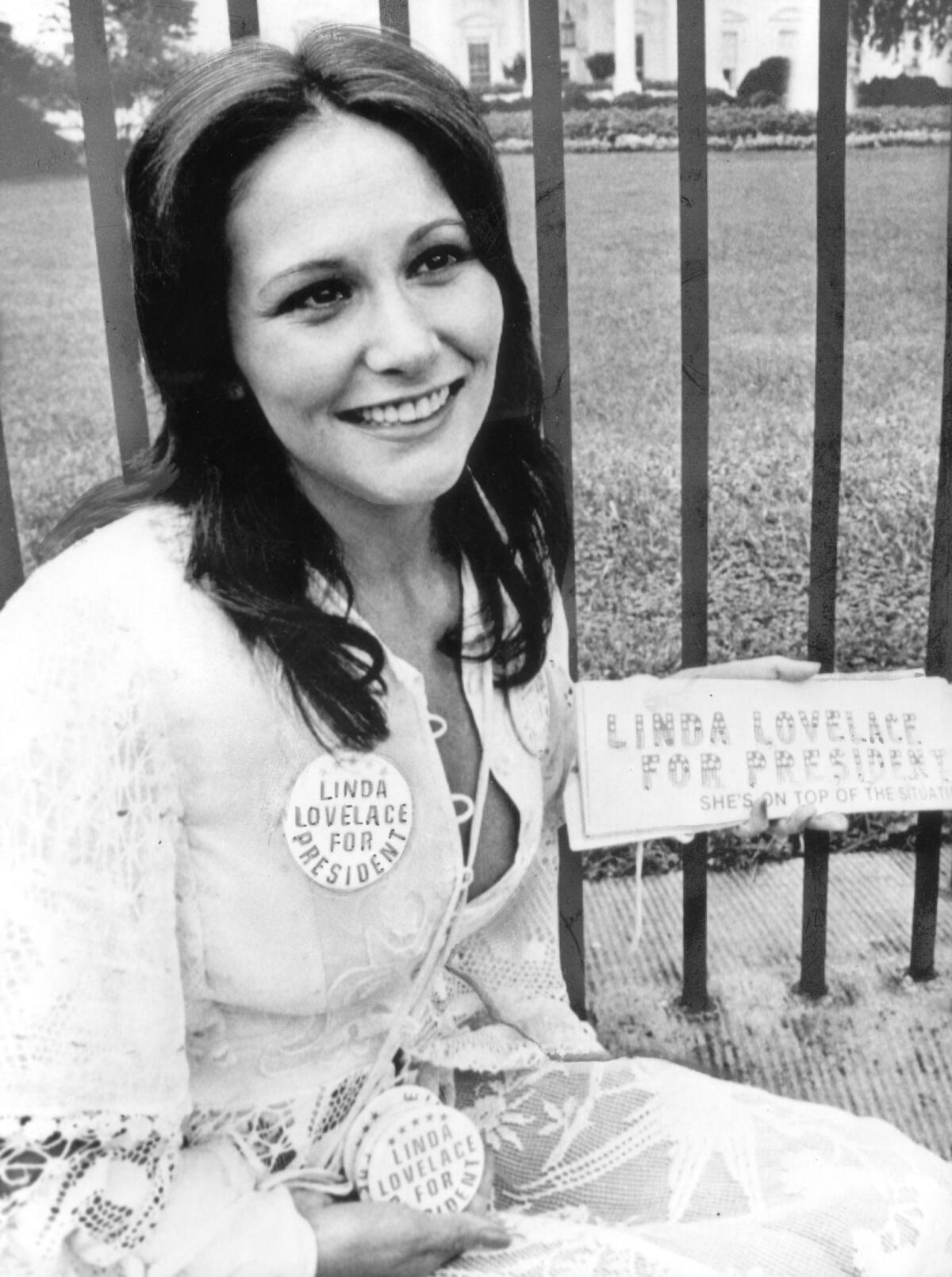
This was the era of “Deep Throat,” the smash 1972 porn film starring Linda Lovelace and Harry Reems that inspired the nickname of the FBI leaker who brought down Richard Nixon. It was when porn made casual appearances in Hollywood films, such as the scene in “Taxi Driver,” from 1976, when
The Pussycat in West Hollywood held splashy premieres, complete with limousines, klieg lights and lines around the block. Out front, the chain’s founder, Vincent Miranda (no relation), had famous porn stars such as Lovelace and Reems leave their prints in the cement, creating a porn walk of fame that exists to this day.
“Miranda was a legendary, game-changing developer,” says Alilunas. “He tried to make adult films respectable. And he really tried to make the theaters equivalent to mainstream theaters so that they would be a pleasant experience for people. There was a real effort to get middle-class consumers to go, and also women.”
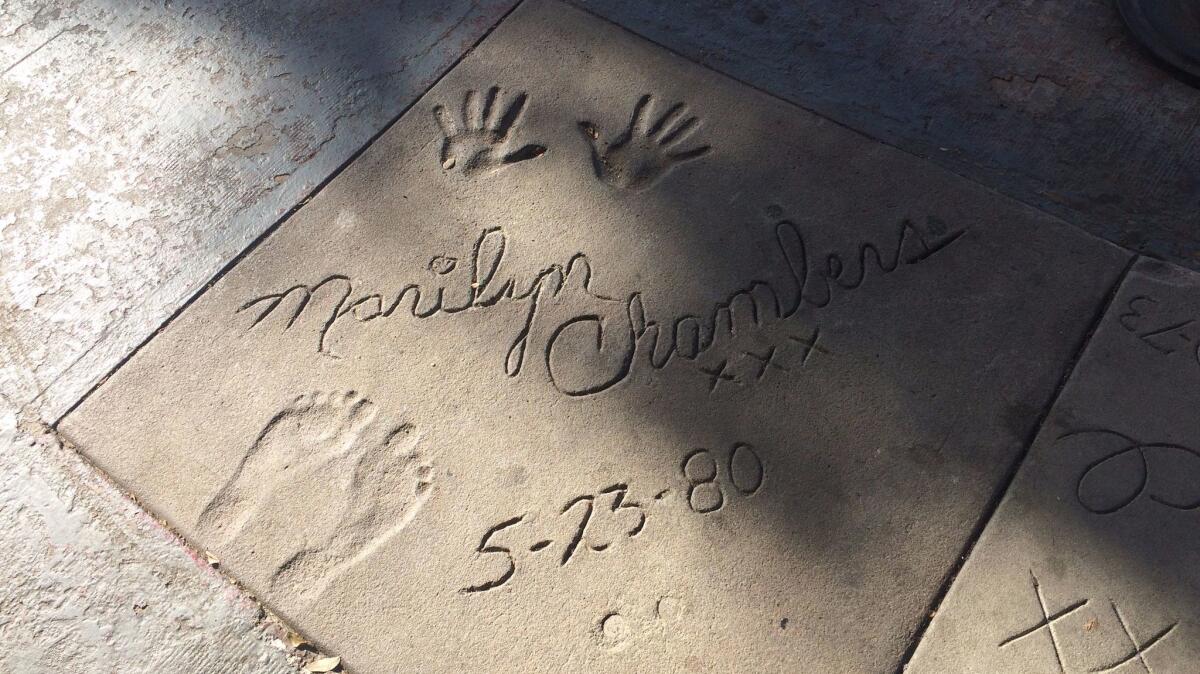
Nina Hartley, an adult star who has appeared in more than 1,000 adult movies — a few of which were shot on actual film — went to see her first adult film at a theater in Berkeley during that era. She was 17.
“It was the ’70s, it was very sex-positive,” she says. “It was ‘The Joy of Sex’ and ‘Everything You Wanted to Know About Sex* (*But Were Afraid to Ask).’ I finally took it upon myself to go see a movie.”
Unlike today, she says of the experience, “you had to go out of your home and risk being seen, risk being recognized. Everyone sat very far apart. You were going there to have a personal experience in a public space.”
For a time, it was a formula that worked. “Deep Throat” played for a decade in Los Angeles at various Pussycat Theaters — along with a host of the era’s other popular porn films, including “The Opening of Misty Beethoven” and “Behind the Green Door.”
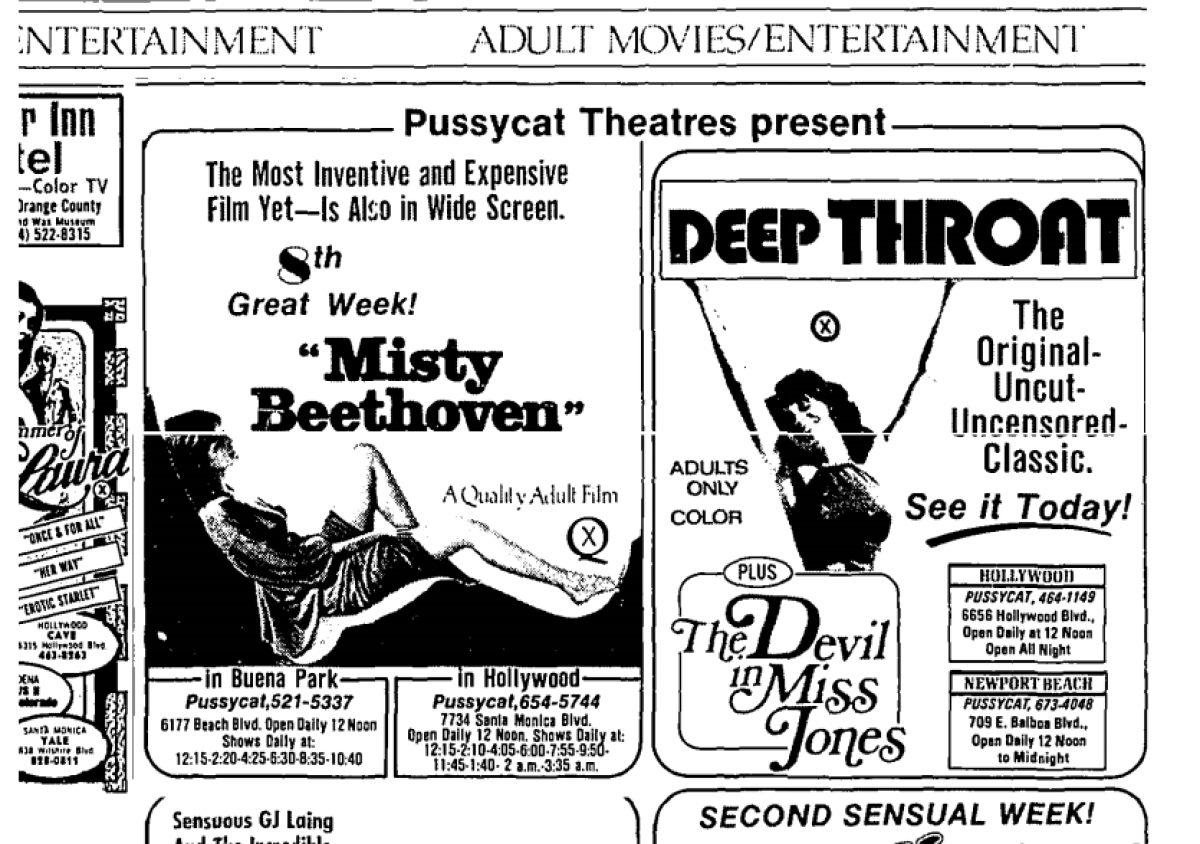
Moreover, for the LGBTQ community, gay porn houses became a kind of safe space.
“They weren’t just theater spaces,” says Mike Stabile, a spokesperson for the Free Speech Coalition, a trade association for the adult industry, and director of the documentary “Smut Capital of America.” “You could go in and have these experiences and they were anonymous.”
“Being a young gay man, it’s tremendously nerve-racking, but there was something about the theater,” he says, “that is closed off from the rest of the world.”
To some degree, this is a purpose the Studs still serves. But anonymity is no longer a primary reason patrons seek out the theater.
“I say, if you want to drink alcohol, there are liquor stores. You can drink in your house. So why are there bars?” asks Studs owner Max Cassing. “Well, people want an experience that is social.”
Cassing, a personable, soft-spoken man who was once a litigation attorney, inherited the theater as payment after a legal battle in 2006. Over time, he made upgrades and partitioned the building into multiplex. In the lobby while we talk, there are two television monitors playing: One displays a slideshow of well-endowed men on a loop. On the other is the Oprah Winfrey Network.
Cassing says people constantly ask him how he keeps the theater running. But even in the age of digital, he says, business is good.
The theater draws people who may not have access to the Internet or those concerned about online privacy, as well as young gay men just beginning to explore their sexuality. “We get a lift whenever the new semesters start,” Cassing says. “We get UCLA and USC, we get all the schools.” But it attracts other groups too.
“We have a dominatrix who comes in regularly with a man on a leash,” he says. “And she once asked everyone in the theater to spank him. It turned into theater.”
Liquor store to porn house
It is early evening when Smith and I arrive at the Tiki, the hour of long shadows and snarled traffic.
Sandwiched between a Oaxacan tlayuda joint and a 99-cent store, the Tiki is housed in a red-tiled building near the 101 Freeway. Englender says the location served as a mini-market and later a liquor store before being converted into a porn house sometime in the late 1970s.
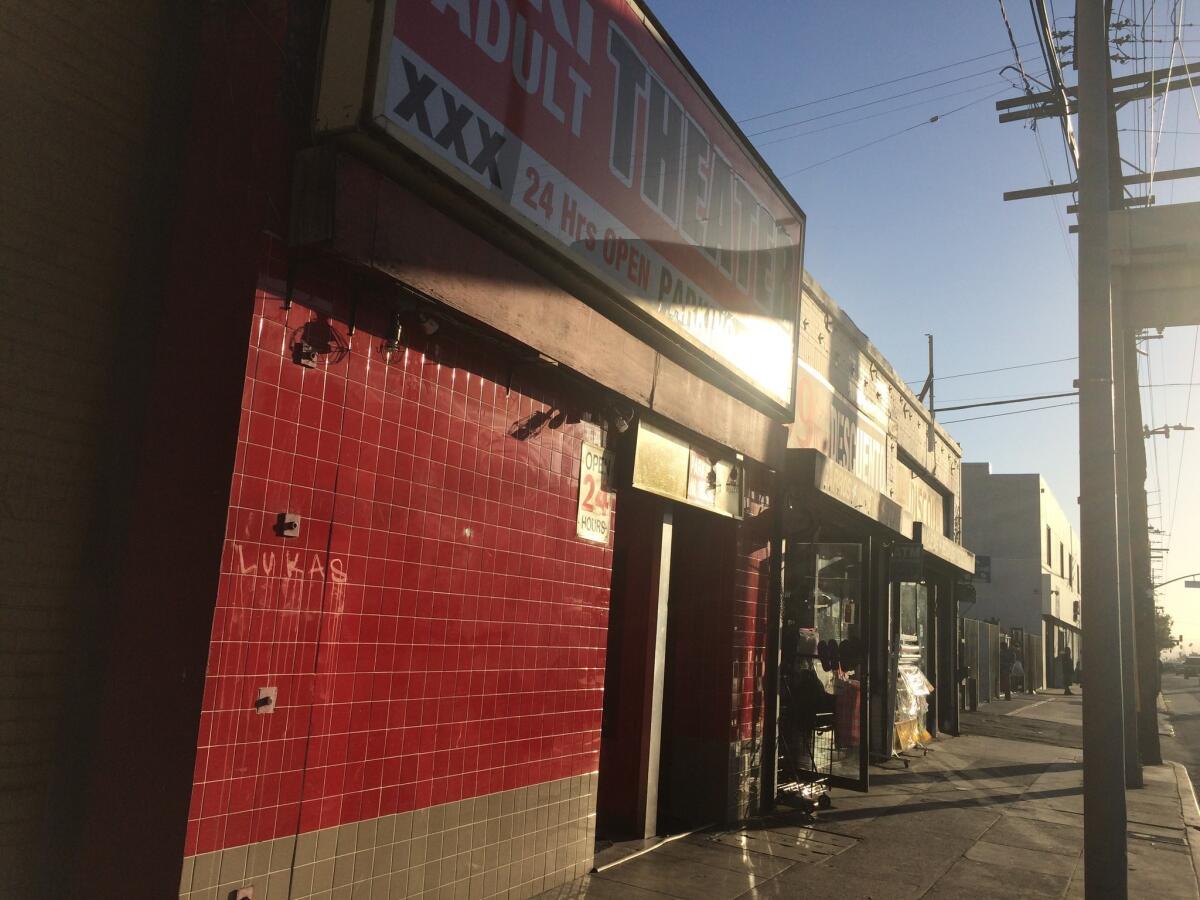
Certainly, to use the word “theater” to describe the Tiki is a stretch. It is a simple storefront with a screen and roughly half a dozen rows of faux leather chairs — the sort you might see in a conference room. Admission is $14 and patrons are greeted by a sign asking them not to open their fly.
The theater is perhaps most famous as the site where comedian
The Tiki is empty when we arrive, but Smith nonetheless chooses to stand. On view is a movie poetically titled “Big Butts Like It Big.”
Watching porn with other people is always about watching the other people watch porn. You’re never in it completely.
— Zak Smith, artist and adult actor
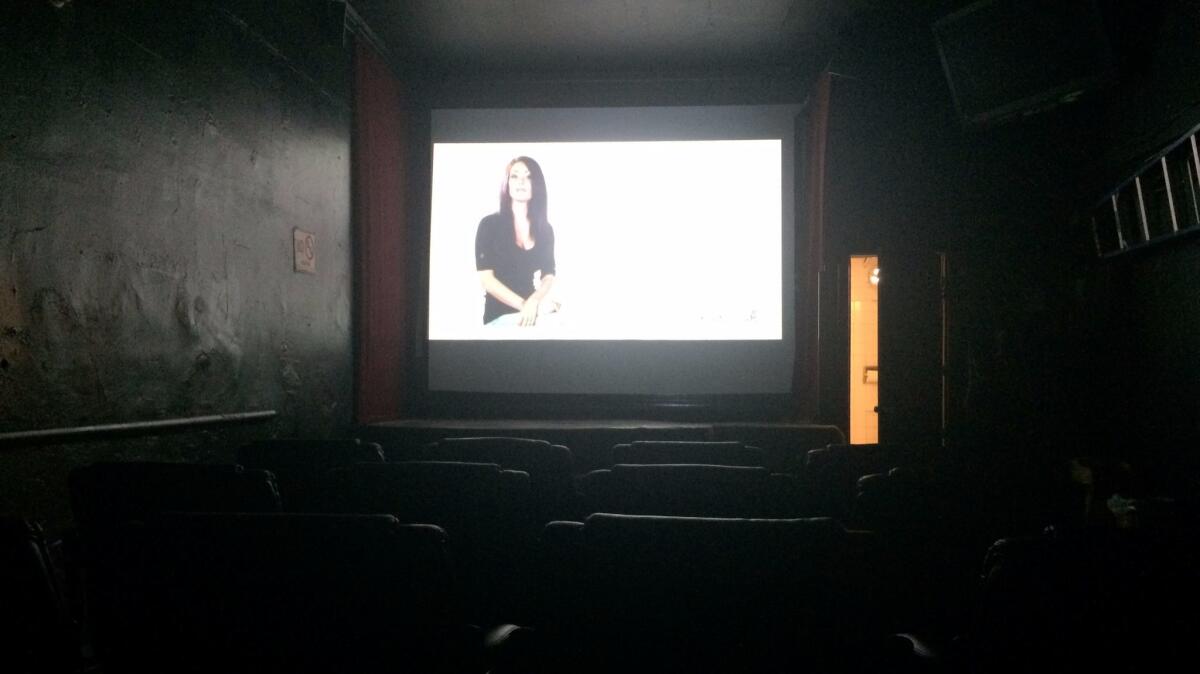
The plot revolves around a scandalous Jerry Springer-type talk show. After the host interviews everyone about various transgressions, the show’s guests have acrobatic sex. (Memorable dialogue: “Right there, right there.”)
“In porn,” Smith tells me, gesturing at the screen, “you don’t need to think of a hot scenario. You just need a new scenario.”
Video may have killed the radio star, but it pretty much annihilated the adult movie theater business.
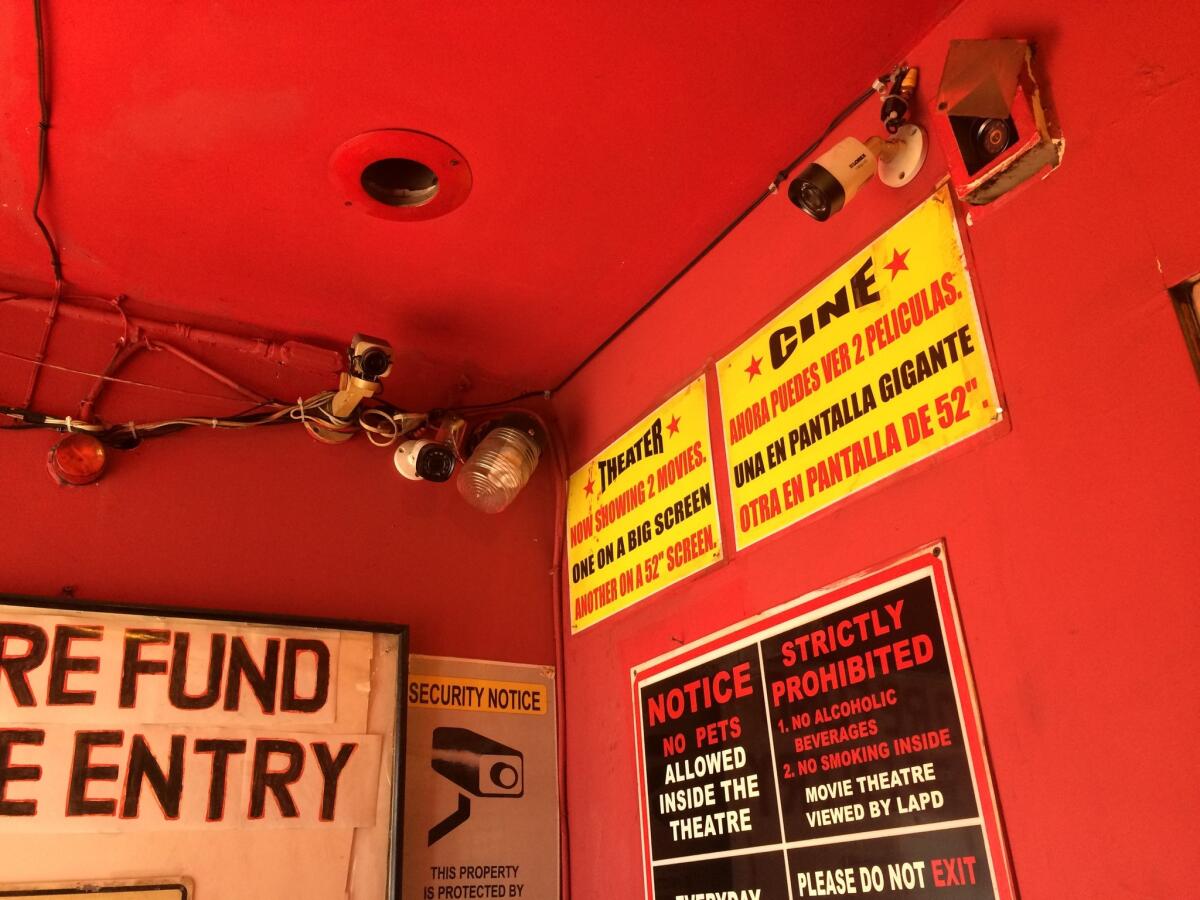
“In 1975, when the Betamax was released, there were a handful of adult companies that took a gamble on technology and it paid off,” Alilunas says. “They took that gamble before Hollywood did. When it came to initial content, it was 50% adult.”
When cheaper VHS technology came into play in the early 1980s, Stabile says, “that was the beginning of the end for theaters.”
Other factors also put pressure on the business: rising real estate prices and local zoning laws. Santa Monica, for example, passed an ordinance in 1981 that banned new adult theaters.
The proprietors of the Tiki could not be reached for comment. But the theater’s modest scale certainly speaks to the diminished standing of the adult theater in contemporary society.
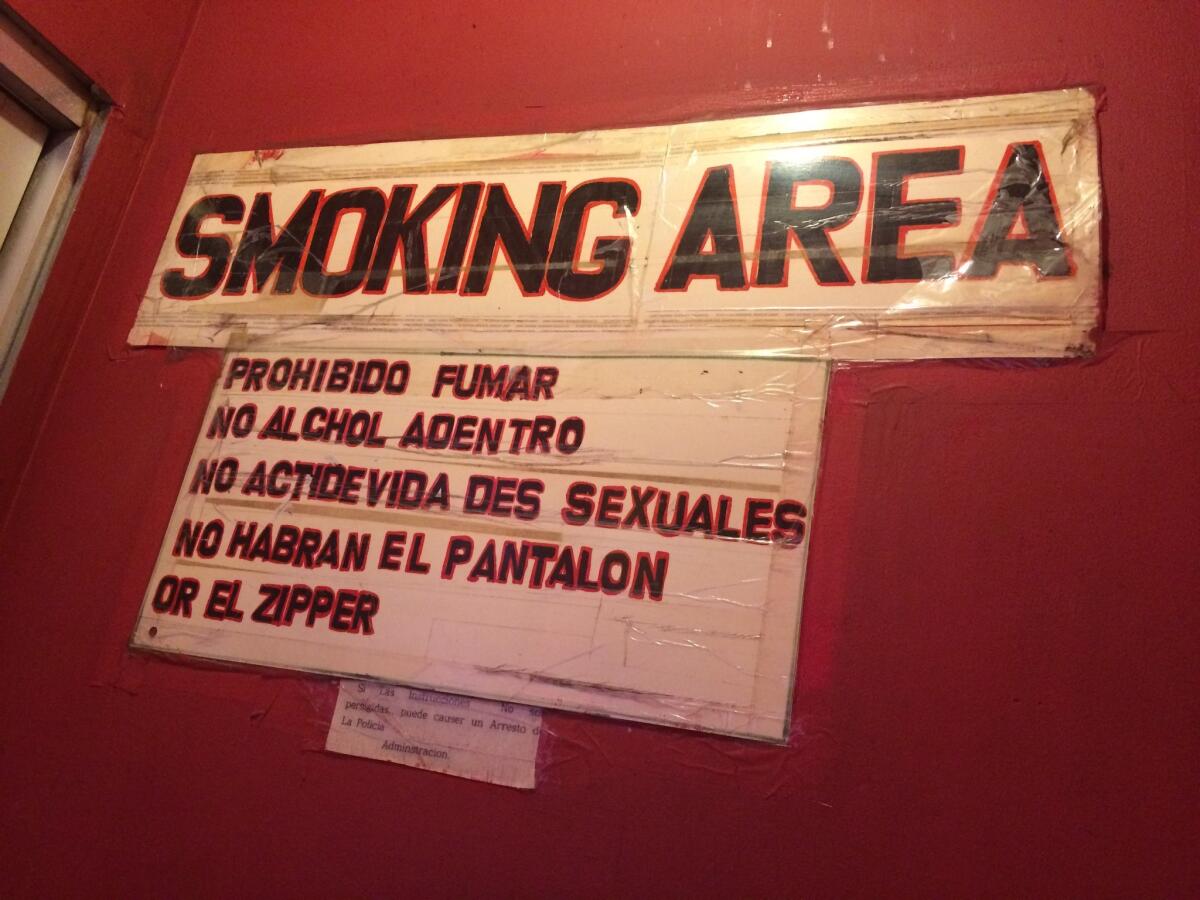
“We are at the tail end of a final piece of an era,” says Alilunas.
But Hartley is hopeful that one or two theaters may survive.
“A lot of of people don’t think sex culture is worth saving,” she says. “But why do we still have the Palm Restaurant? That hasn’t been fashionable for 50 years, but it’s still there.”
“As an exercise in nostalgia, I’d like to see the theaters stay.”
Sign up for our weekly Essential Arts & Culture newsletter »
ALSO
Rumbling seats. Virtual realty. Booze. Theaters plot the future of cinema
Inside Alejandro Iñárritu's VR border drama at LACMA: What you will see and why you might cry
Harry Reems, 1947-2013: Adult film actor starred in ’Deep Throat’
The new crossover artists: Porn stars are landing legit work. Pop culture is besotted
The biggest entertainment stories
Get our big stories about Hollywood, film, television, music, arts, culture and more right in your inbox as soon as they publish.
You may occasionally receive promotional content from the Los Angeles Times.








